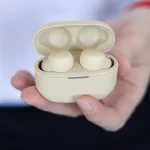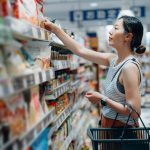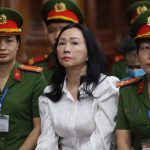Mr Morrison said the quarantine facility at Howard Springs would likely be expanded. “Already expanding it to 850, and potentially well beyond that, which would involve a more than doubling of that capacity at Howard Springs,” he told reporters. Mr Morrison also said the “risk” of COVID-19 was “shifting” due to the emergence of deadly mutant strains in the UK and South Africa. Speaking after national cabinet, chief health officer Professor Paul Kelly addressed the threat of COVID transmission in hotel quarantine, saying “human error” was a concern.“There is absolutely a need to continually improve the quality of our quarantine,” Professor Kelly said.“We’ve seen only a small number of incursions from quarantine, and we need to understand these are complex systems with humans, and there is always an opportunity or a chance of human error.“There is also chance issues like two doors opening across a corridor, as has seemed to have occurred in the Victorian situation.“the system has worked very effectively up to now, and continues to work very effectively.”
It came as the states clashed over who should take accountability for the coronavirus hotel quarantine program, with a string of hotel worker infections leading to snap lockdowns and tougher restrictions across the country.
According to a report in The Australian, Queensland Deputy Premier Steven Miles said it was “time for the federal government to contribute” to the quarantine program and claimed Mr Morrison had been “all care and no responsibility”.Meantime, Victorian Premier Daniel Andrews said he would talk to the federal government about “bespoke” accommodation for travellers returning to Australia, and West Australian Premier Mark McGowan called on the federal government to take more accountability in the quarantine scheme.
NED-1859 State of our borders
The national cabinet meeting came after a five-day lockdown in Perth, which went into effect after a quarantine hotel security guard contracted the virulent British COVID-19 variant from a returned traveller and after stricter restrictions were introduced in Melbourne for a similar breach.Mr Morrison has defended the use of hotels to quarantine travellers and urged state leaders to have “a sense of realism … and a sense of proportion”.He said hotels remained the most effective way to quarantine for travellers at the extent that Australia needed to provide.“That remains the advice I have from my experts and the alternative is not that clear to me,” he said, according to The Australian.
Mr Morrison pointed out that more than 211,000 people had travelled to Australia during the pandemic and that there had only been a small number of coronavirus cases transmitted into the community.Meanwhile, Mr Morrison rejected a proposal from the Queensland government to quarantine travellers in Gladstone, but he was considering a different plan to house up to 6000 people at Wellcamp airport west of Toowoomba at a yet-to-be-built, purpose-designed facility.Federal authorities are understood to have a long list of questions to be answered before making any commitments.“The commonwealth is open where there are good proposals, very comprehensive proposals,” Mr Morrison said.
COVID-19 vaccine rollout
WA ‘OUT OF LOCKDOWN’Lockdown will end in Western Australia after no new cases of COVID-19 were recorded overnight, but if you want to avoid wearing a mask outside you will probably have to run for it.Professor Kelly made the announcement of no new local infections in Australia at a press conference — less than an hour before WA Premier Mark McGowan was due to face the media.“As of midday today, there’s been six new cases in the last 24 hours, all in hotel quarantine. No locally acquired cases,” Professor Kelly said.About two million people in the Perth, Peel and South West regions were plunged into a five-day lockdown on Sunday night after a hotel quarantine security guard tested positive for the highly contagious UK strain of COVID-19.
VICTORIA REPORTS ZERO NEW CASESVictoria has recorded no new local coronavirus cases despite thousands of people turning out to get tested after a hotel quarantine worker tested positive.More than 14,600 Victorians were swabbed at testing stations across the state on Thursday, the health department said, with the waiting times at some sites stretching longer than three hours.The health department confirmed three new cases were recorded on Thursday morning, all in returned travellers in hotel quarantine.There are 24 active cases in Victoria – 23 in hotel quarantine and one locally acquired case.The rush to get tested came after a 26-year-old man from Noble Park, who was working for the Australian Open quarantine program, returned a positive COVID-19 test result on Wednesday.The worker was stationed at the Grand Hyatt Hotel and last worked on January 29.
The health department said on Thursday night 15 of the man’s 17 social and household contacts had tested negative.The final two results are expected on Friday.The health department has revealed 14 potential public exposure sites with anyone who has visited the “tier 1” sites during the times listed required to immediately isolate, get tested and remain isolated for 14 days from the time they were at the site.
Health authorities have also opened four additional testing sites in the Melbourne CBD, Monash Clayton, Dandenong South and Noble Park North, while another 15 stations across the southeast suburbs have extended their operating hours.The total number of confirmed cases in Victoria since the beginning of the pandemic is now 20,452.
When will I be able to get the vaccine?
VACCINE VICTORYIt comes as Australia has secured another 10 million doses of the Pfizer-BioNtech COVID-19 vaccine, Prime Minister Scott Morrison said.The boost in what is widely considered to be the world’s most effective coronavirus jab means Australia now has 150 million doses — 20 million of which are for the Pfizer vaccine — across three inoculation varieties.Health Minister Greg Hunt said the order provided “additional support over and above that which was already in place.”Secretary of the Department of Health, Professor Brendan Murphy, said Australia was in a strong position with three vaccines rolling out this year.
“That is a position that we wouldn’t have dreamt of a year ago, six months ago,” Prof Murphy said.He said the Pfizer and AstraZeneca vaccines were set to be rolled out early this year pending approval from the Therapeutic Goods Administration, while the Novavax jab would be introduced “later on”.“All of these three vaccines have now been shown to be highly effective at preventing clinical COVID disease, and particularly severe COVID disease,” Prof Murphy said.
Prof Murphy added there was some “early, encouraging information” from the UK that the AstraZeneca vaccine showed some evidence of preventing transmission of the coronavirus and not just stopping the development of the COVID-19 disease.Australia has 53.8 million doses of the AstraZeneca jab on order which will be manufactured onshore.Prof Murphy said the Pfizer vaccine would be distributed via “dedicated state and territory-run Pfizer hubs”.He said it would be offered to: “border workers, quarantine workers, very exposed frontline healthcare workers, such as ICU, emergency department, and most importantly, the most vulnerable people – people in residential aged care, residential disability care, and those workers.”He said Australians would not have a choice in which vaccine they receive, but added both jabs were “extremely good”.
NED-1859 State of our borders
NSWThere are no restrictions around travelling to or from regional or rural NSW, or other areas of NSW.However, NSW Health currently recommends practising COVID safe behaviours such as physical distancing and hand hygiene when travelling within NSW, especially between Greater Sydney and regional and rural areas.All arrivals from Western Australia will be required complete an interstate traveller declaration confirming whether they attended any venues of concern. If so, they will be required to isolate for 14 days.
Travellers who have been in the WA’s Peel region, Perth and the South West region since January 25 will be required to get tested within 48 hours of arriving in NSW.
They will also have to follow the same lockdown rules as WA residents, including staying home for five days – until 5pm Friday. “If they do not get tested, they are required to remain at home for a total of 14 days,” the department said.
SOUTH AUSTRALIASydneysiders are allowed to travel into South Australia.But visitors will need to be tested on day one, five and 12 of their stay and must isolate until they receive a negative result from their first swab.Travellers from outside of the Greater Sydney area will have no restrictions and do not need to be tested. Travellers from Victoria, Queensland, Tasmania, Tasmania, the Northern Territory and the ACT can enter without restriction but must complete a Cross Border Travel Registration.SA’s hard border closure with WA will be dropped immediately.Anyone who is in quarantine after arriving in South Australia from Western Australia can end their quarantine immediately, unless they were at the Four Points Hotel.It means more than 1300 people can leave quarantine immediately.Travellers from Perth hot spots will still be required to get a test on days one, five and 12 and isolate until they get their first negative test result.VICTORIAPeople from anywhere in Australia entering Victoria must apply for a permit to enter the state.Victoria has also reopened its border to the majority of NSW.However, those from the Cumberland LGA will need to apply for an “orange zone” permit, meaning travellers from the area will need to take a COVID-19 test within 72 hours after arriving in Victoria and isolate both before and after the test.Victoria has also slammed its border shut to the majority of Western Australia.Anyone who tries to cross the border from a ‘red zone’ will face a $5000 fine.Travellers who have visited Perth metropolitan area, the Peel region and the South West region of Western Australia since January 25 will not be allowed to enter Victoria.Those caught flouting the ban will be taken straight to hotel quarantine.
NORTHERN TERRITORYThe Northern Territory have declared 10 Melbourne suburbs as hot spots. The suburbs include: Melbourne, West Melbourne, Noble Park, Keysborough, Springvale, Brighton, Brandon Park, Clayton South, Heatherton and Moorabbin.All arrivals to the Northern Territory (NT) must fill in a Border Entry Form and complete 14 days of mandatory supervised quarantine at their own expense, if they have recently been in an active declared COVID-19 hot spot. This includes children returning from a hotspot.Perth and surrounds have been declared a COVID-19 hotspot by health officials in the Top End.All travellers entering the Northern Territory from 7.30pm Sunday, January, 31 are required to go into mandatory quarantine in either Alice Springs or Darwin at a cost of $2500 per person.
QUEENSLANDFrom Monday, February 1, anyone who has been in any part of New South Wales will be able to enter Queensland, by any means of travel, without having to quarantine or having to complete a border passPeople from most other parts of Australia can travel to Queensland freely.However, anyone who has been in Western Australia’s LGAs of concern and arrive in Queensland after 6pm on Sunday, January 31, will be forced into 14 days of hotel quarantine.Queensland Health said anyone who is already in Queensland and has been to Perth, the Peel or South West regions since January 25 should come forward for testing and isolate until they receive a negative result.
WESTERN AUSTRALIAParts of Western Australia will entered a five-day lockdown at 6pm WST on Sunday, January 31.The West Australian LGAs impacted by the lockdown include:Peel region: Boddington, Mandurah, Murray, Serpentine-Jarrahdale, WaroonaPerth Metro region: Armadale, Bassendean, Bayswater, Belmont, Cambridge, Canning, Claremont, Cockburn, Cottesloe, East Fremantle, Fremantle, Gosnells, Joondalup, Kalamundra, Kwinana, Melville, Mosman Park, Mundaring, Nedlands, Peppermint Grove, Perth, Rockingham, South Perth, Stirling, Subiaco, Swan, Victoria Park, Vincent, WannerooSouthwest region: Augusta-Margaret River, Boyup Brook, Bridgetown-Greenbushes, Bunbury, Busselton, Capel, Collie, Dardanup, Donnybrook-Balingup, Harvey, Manjimu, Nannup.TASMANIATasmania has fully reopened its border with NSW.
The state has deemed Perth and the Peel and South West regions of WA as high-risk and travel is not permitted. Anyone seeking an exemption must use the state’s G2G Pass system. All other areas of Australia are low risk, with no quarantine requirements, but travellers must register with Tas e-Travel.Those from other areas of Australia can travel to Tasmania without restriction.AUSTRALIAN CAPITAL TERRITORYACT Health has urged anyone who has been in the parts of Western Australia currently in lockdown since January 25, to quarantine.Deputy chief health officer Vanessa Johnston said the quarantine period would be the same as the five-days enforced in WA.However, people from WA as well as other parts of Australia can still travel to the ACT.
Powered by WPeMatico






